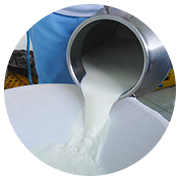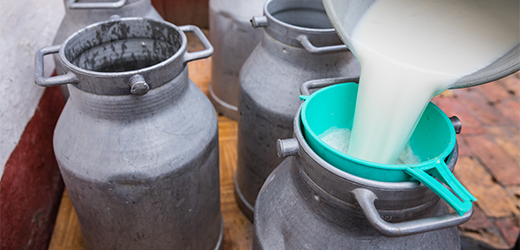Some of the biggest challenges that the farmers faced were the safe and effective transportation of milk from the farm to the cooperative or to a factory. This was mainly due to the poor condition of the roads and unavailability of good transport vehicles as farmers had to travel several kilometers to sell their produce. This resulted in a large portion of the milk being wasted, sometimes up to 50-60%.
PDFL through its farmer initiative program began to establish a flurry of Milk collection centers (MCC) in and around the region of Mbarara from where most of the farming community stay. By being closer to the community the farmers now need not have to transport the milk over long distances anymore and they can sell their milk to the MCC closest to them. The milk is stored and cooled in Bulk chilling tanks from where PDFL transports the milk to the manufacturing facility thereby reducing the transportation cost incurred by the farmers.
The following factors were taken into consideration before setting up a Milk Collection Center:
Number of farmers/milk producers in a given area
Ideal area with minimal competition and maximum coverage
Ideal distance from target farms with acceptable levels of roads and infrastructure
Maximum time taken to reach MCC from target farms
Availability of water source and electricity
Bulk cooling plants of either 3,000 lt. / 5,000 lt. Capacity
Water Storage Tank
Generator set
Milk analyzer set
Laboratory testing equipment
The first two Milk Collection Centers were established in Biharwe and Sangwe regions and were received well by farmers and vendors.
All MCC staff hired are given intensive training on various parameters.
The staff are sensitized and trained to follow all safety procedures and collections procedures to ensure that the quality of milk being collected are as per the prescribed standards.
To ensure smooth operations supervisors and squad visits’ help in supporting the staff. The staff are expected to be in appropriate attire including gloves, lab coats and gum-boots so as to be compliant with all safety and hygienic procedure.

Milk Collection
The milk collection process beings at 8 AM every day with the farmers and vendors bringing the milk in Stainless steel or Aluminium Cans.

Hygiene Check
The MCC staff ensures that all surfaces in contact with the milk are cleaned with cleaning liquid, and rinsed with warm water

Organoleptic Testing
The milk undergoes Organoleptic testing where the appearance, odor and the taste are evaluated and the milk is segregated

Adulteration Testing
The approved samples are tested by taking 100ml from each sample and are checked for adulteration, Fat, and Solid Non Fats standards.
By following the above process, the Milk Collection Center’s objective to improve the quality of farmers’ lives are met day by day. By standardizing market rates, all farmers, either supplying their milk to the Milk Collection Center or not realize more for their milk and the initiative has been a direct influence of the same.
The Milk Collection Center in Biharwe and Sanga regions has seen critical improvements in the quantity and quality of milk being collected as a direct result of the efforts put in by the DDE on field.
The DDE’s are given the training to provide instructions, teach and sensitize the farming community on the various topics like Cattle Management, Disease Prevention, Milking, Calving, Milk Collection, Milk transportation and Quality maintenance. Regular meetings, are conducted in the MCC to constantly communicate the need for improved farming practices.


PDFL’s Milk Collection Centers support the community by ensuring that;
- all farmers are paid with the most competitive rates improving their overall profitability,
- all farmers are paid based on the quality of milk promoting the need to learn and adapt to a more quality collection and milk processes,
- all farmers are paid bi-monthly without delays to ensure cash flow in their systems are active.


